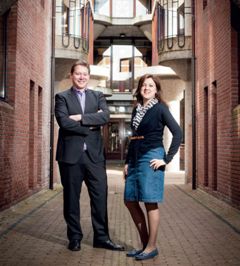Dying languages get digital home
A SURF project has helped create a digital home for dying languages, writes Aad van de Wijngaart

When Roberta D’Alessandro, professor of Italian at Leiden University in the Netherlands, and her team discovered that old dialects from parts of Italy have more in common grammatically with Basque, Georgian, or Hindi than with the language of Dante they knew they needed to explore this further. As she explained, ‘It doesn’t fit in at all with what we used to think about "language families", but it’s a fact that we cannot ignore.’
Such observations give great insight into the development of languages but can be missed when the numbers of people speaking a dialect become very small or the dialect stops being spoken. To ensure that the language can continue to be studied, members of D’Alessandro’s research group began recording the last native speakers of the dialect in the Abruzzo region of Italy.
But recording a language is only part of the story. The question that arose was how to store all the material to make comparative research easier. ‘At the other universities where I’ve worked, in Germany and the UK, everything was on a project basis,’ said D’Alessandro. ‘You ended up with a website with material that was then "frozen", so to speak. You couldn’t expand or alter anything, let alone combine it with material from other projects. In Leiden, we wanted to have a shared platform for all our research. I want to be able to upload data or a draft version of an article and ask my colleagues what they think of it. After all, we are a research group.’
These aims complemented the goals of the CARDS (Controlled Access to Research Data Stored Securely) project of SURF in the Netherlands, which were to make it easier and more secure for researchers to manage and share data. D’Alessandro approached her university library to build a digital workspace for her research group and beyond.
As Peter Verhaar, the library’s project manager, explained, ‘CARDS involved exchanging a great deal of information, not just during meetings but also in the form of documentation, templates, questionnaires and other ways. To design the management system for research data properly, the data specialists needed expertise in many different fields. Above all, they needed to understand what the researcher was talking about.’
The most important choices concerned the metadata for classifying the research data. D’Alessandro noted: ‘We linked up with the most relevant existing databases. That makes it easy for other researchers to reuse our material. At the moment, it’s still protected because people are using it to write their dissertations, but it would be ridiculous just to keep everything to ourselves. We’re not doing it for the money, of course, or even for our reputation. We’re dealing with languages that will soon have disappeared. They can continue to exist online.’
CARDS ran during 2011 and involved the DANS data archive and Tilburg, Twente, Amsterdam, and VU universities, in addition to Leiden. The main recommendations to come out of the project were: to formulate policy on data management; to ensure proper support; and to ensure an effective infrastructure for data management and data storage. Based on the experience gained during the project, a digital information package has been created for planning data management for future research.
A version of this article first appeared in the June issue of SURF magazine






